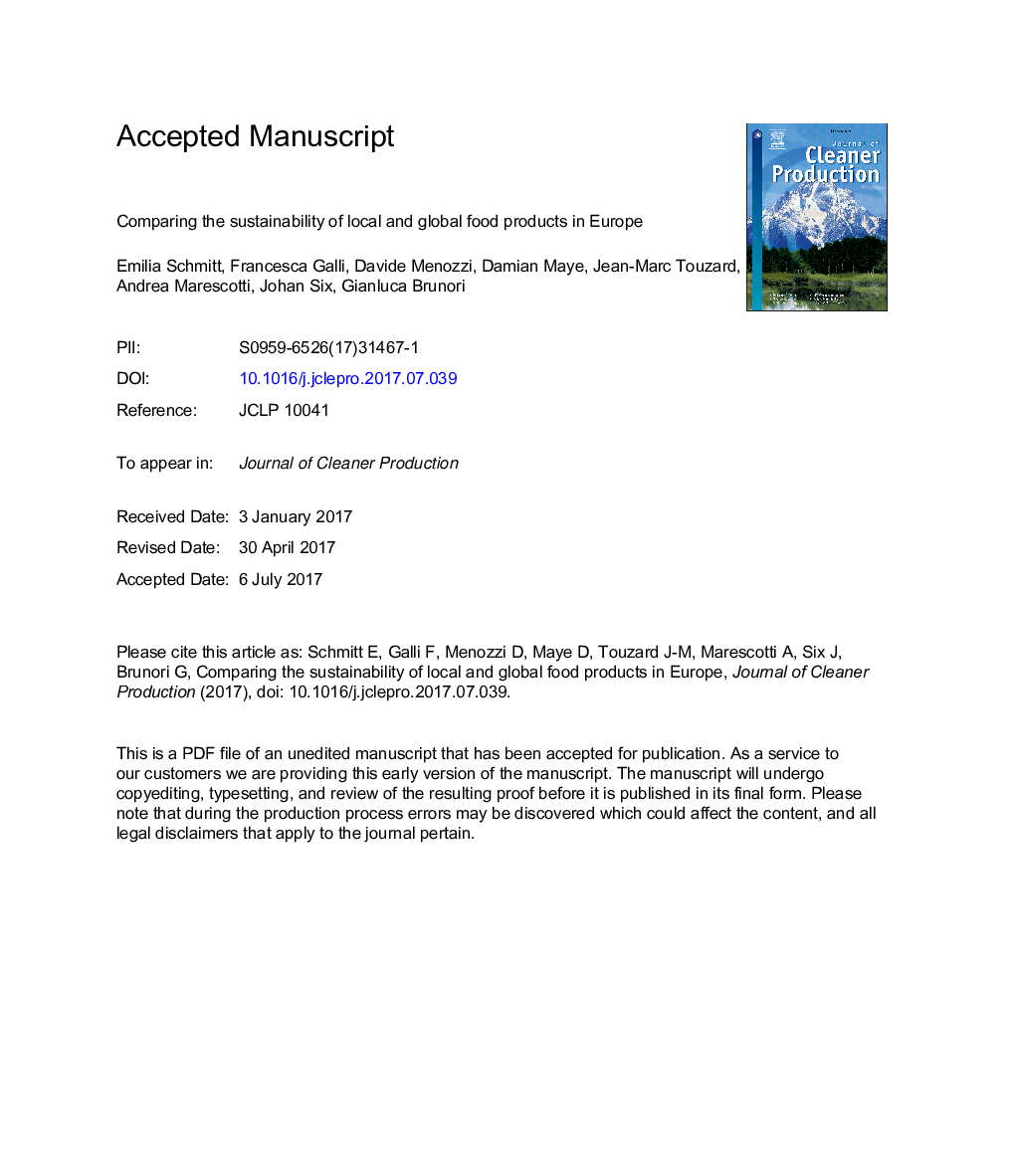| کد مقاله | کد نشریه | سال انتشار | مقاله انگلیسی | نسخه تمام متن |
|---|---|---|---|---|
| 5480009 | 1522089 | 2017 | 33 صفحه PDF | دانلود رایگان |
عنوان انگلیسی مقاله ISI
Comparing the sustainability of local and global food products in Europe
ترجمه فارسی عنوان
مقایسه پایداری محصولات غذایی محلی و جهانی در اروپا
دانلود مقاله + سفارش ترجمه
دانلود مقاله ISI انگلیسی
رایگان برای ایرانیان
کلمات کلیدی
غذای محلی، غذای جهانی، پایداری، تجزیه و تحلیل چند معیاره، فراتر رفتن، محل سکونت،
ترجمه چکیده
در بحث پیرامون آینده پایدار مواد غذایی، ادعا می کند که خرید محلی است؟ در نشریات و رسانه ها گسترده شده است، حمایت شده توسط گفتمان که خرید مواد غذایی محلی ؟؟ مزایای زیست محیطی، بهداشتی و اجتماعی-اقتصادی را فراهم می کند. با درک عدم وجود شواهد علمی برای این ادعا، این مقاله با هدف مقایسه ارقام ارزیابی پایداری برای 14 محصول غذایی محلی و جهانی در چهار بخش در چهار کشور اروپایی است. هر بخش به طور مستقل با استفاده از شاخص های پایداری در پنج بعد پایداری: محیط زیست، اقتصادی، اجتماعی، بهداشتی و اخلاقی مورد تجزیه و تحلیل قرار گرفته است. برای تعیین اینکه آیا محصولات محلی به طور کلی بهتر عمل می کنند، تجزیه و تحلیل فوق العاده ای انجام شد تا محصولات را نسبت به عملکرد پایداری خود رتبه بندی کنند. پیشروی روش متداول تصمیم گیری چند معیاره است که امکان مقایسه آن ها را با شاخص های کمی و کیفی در مقیاس های مختلف فراهم می کند. هر محصول همچنین دارای درجه ای از مکان برای ارتباط پایداری و محلی است. نتایج به دست آمده در قالب جریانهای فی است که نمرات نسبی نسبی یک محصول نسبت به دیگران در یک بخش مشابه است. رتبه بندی نشان می دهد که محصولات جهانی به طور مداوم با توجه به پایداری، حتی زمانی که توابع اولویت و وزن شاخص ها متنوع بودند. اولین موقعیت رتبه بندی، یا بیشترین محصول محلی یا محلی بود. علاوه بر این، رتبه بندی دقیق در سطح ویژگی ها، توانایی ها و ضعف های نسبی هر محصول غذایی را در پیوستۀ محلی-جهانی نشان داد. به نظر می رسد که قدرت محصولات محلی و واسطه عمدتا در ابعاد بهداشتی و اجتماعی و اقتصادی، به ویژه جنبه های مراقبت و ارتباط با قلمرو از قبیل تنوع زیستی، رفاه حیوانات، حکومتداری یا انعطاف پذیری است. در ارتباط با محصولات غذایی جهانی، آنها از لحاظ مقابله با تغییرات اقلیمی و مقرون به صرفه بودن به مصرف کنندگان، مزایایی چشمگیر داشتند. این تناقض با ادعای زیست محیطی غذا است. بنابراین ما نتیجه گرفتیم که فاصله مهم ترین عامل بهبود پایداری محصولات غذایی نیست و دیگر معیارهای محلی (هویت، حکومت یا اندازه) نقشی حیاتی دارند.
موضوعات مرتبط
مهندسی و علوم پایه
مهندسی انرژی
انرژی های تجدید پذیر، توسعه پایدار و محیط زیست
چکیده انگلیسی
In the debate surrounding the sustainable future of food, claims like “buy local” are widespread in publications and the media, supported by the discourse that buying “local food” provides ecological, health and socio-economic benefits. Recognising the lack of scientific evidence for this claim, this paper aims to compare the results of sustainability assessments for 14 local and global food products in four sectors within four European countries. Each sector has been analysed independently using sustainability indicators across five dimensions of sustainability: environmental, economic, social, health and ethics. In order to determine if local products generally perform better, an outranking analysis was conducted to rank the products relative to their sustainability performance. Outranking is a multi-criteria decision aid method that allows comparison of alternatives based on quantitative and qualitative indicators at different scales. Each product is also characterized by a degree of localness in order to relate sustainability and localness. The results are given in the form of phi flows, which are relative preference scores of one product compared to other ones in the same sector. The rankings showed that global products consistently come last in terms of sustainability, even when the preference functions and weighting of the indicators were varied. The first positions of the rankings were taken either by the most local or an intermediary product. Moreover, detailed rankings at the attribute level showed the relative strengths and weaknesses of each food product along the local-global continuum. It appeared that the strength of local and intermediary products was mainly in health and socio-economic dimensions, particularly aspects of care and links to the territory such as biodiversity, animal welfare, governance or resilience. In relation to global food products, they presented substantial advantages in terms of climate change mitigation and affordability to consumers. This contrasts with the food-miles ecological claim. Thus, we conclude that distance is not the most critical factor in improving sustainability of food products, and that other criteria of localness (identity, governance or size) play a more critical role.
ناشر
Database: Elsevier - ScienceDirect (ساینس دایرکت)
Journal: Journal of Cleaner Production - Volume 165, 1 November 2017, Pages 346-359
Journal: Journal of Cleaner Production - Volume 165, 1 November 2017, Pages 346-359
نویسندگان
Emilia Schmitt, Francesca Galli, Davide Menozzi, Damian Maye, Jean-Marc Touzard, Andrea Marescotti, Johan Six, Gianluca Brunori,
